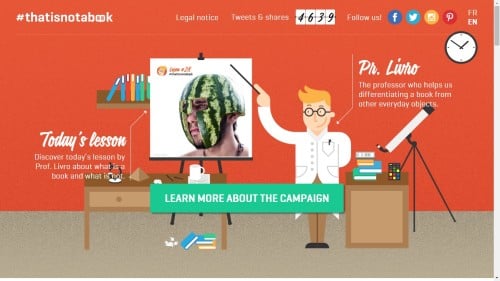Amazon launched a new affiliate program  for indie booksellers yesterday. They’re paying booksellers a small commission on hardware sales and a 10% commission on ebook sales, all the while pitching the program as a great idea. “Now your customers don’t have to choose between e-books and their favorite bookstore,” Amazon says in its pitch to booksellers.
for indie booksellers yesterday. They’re paying booksellers a small commission on hardware sales and a 10% commission on ebook sales, all the while pitching the program as a great idea. “Now your customers don’t have to choose between e-books and their favorite bookstore,” Amazon says in its pitch to booksellers.
Booksellers, on the other hand, see things differently.
A number of indie bookstores across the US have spoken out about the program, and there have even been a few negative responses from the UK. (Even though this program is only available in the US, and not even the entire country).
The responses so far (as reported by Wired, PW, MobyLives, and even The Bookseller) have been uniformly negative (with a single neutral response). It’s not clear whether the coverage is biased, but I would tend to think it is not. All of the responses I have found so far match with what I was expecting to read.
Lissa Muscatine, co-owner of the Politics and Prose bookstore in DC, said: “We are not enticed in the least by the latest ‘offer’ from Amazon. It’s a dagger disguised as an olive branch – the latest effort by Amazon to gain traction with indie customers and loyalists.”
Her opinion was echoed by Suzanna Hermans, co-owner of Oblong Books & Music in Rhinebeck, N.Y., and president of the New England Independent Booksellers Association: “If Amazon thinks indie bookstores will become agents for the Kindle, they are sorely mistaken. There is no way I will promote Amazon products in my stores after the havoc they have wreaked on our industry as a whole. Sorry, Jeff. I’m not buying it.”
Several booksellers iterated the "Amazon is out to steal customers" theme. Michael Tucker, president and CEO of Books Inc., a 12-store indie chain based in San Francisco, described it as more or less a form of suicide. "In the long term, for anyone who gets into it, they would be losing their customers for what would end up a very small return."
Steve Bercu, co-owner of BookPeople in Austin, Texas, and current president of the ABA, agrees: "They’re attempting to acquire independent bookstores’ customers for two years of commission. This is simply in general not aligned with the interests of most independents."
I must say that my favorite response was the one from Left Bank Books.
Author and owner Kris Kleindienst has a skill for sarcasm that exceeds my own: "Left Bank Books announces its new program whereby Amazon.com buys its books from us at a fifty percent markup over list price. They will also be charged shipping. We believe this will allow Amazon to be a part of the bricks and mortar experience that they can’t do without. Prior to this program Amazon was forced to make do with warehouses in tax free environments that did not leave their customers with that satisfied, ’I supported my local economy’ feeling they increasingly want. Now with the innovative Left Bank Books program they are easily able to stay relevant in a world that demands more integrity from its retail experience."
And finally, the generally negative response is coming from more than just US booksellers. While this program is still limited to the US, booksellers in the UK have already weighed in with their opinion.
Tim Walker, owner of Walkers bookshops, said: "One would have to ask the question ‘Why would Amazon want to take that step? Where is the motivation?’ Because at the end of the day, they haven’t really ever given a stuff about everyone else in the book trade . . . My worry would be that by selling Kindle devices, we would be converting customers to using Amazon for their physical book sales as well as e-books. I would be very reluctant to jump in."
Sheila O’Reilly, owner of Dulwich Books in London, said: "I think I would search my heart and find that morally I just couldn’t stock the Kindle. I know Amazon employ lots of people in this country but they also have head offices in Luxembourg and Ireland for tax avoidance reasons and I couldn’t ignore that. If it was more of a level playing field between Amazon and independents then maybe I would think about it, but it isn’t."
To be honest, none of this comes as a surprise. The general tenor of the responses matches with what the very first bookseller said when news about this program broke in June.
Though I do find it strange that a few of these booksellers participate in the ABA partnership with Kobo; I don’t see how only Amazon is going to steal away customers.
Sources:
- Amazon’s New Kindle Offer Rejected by Indie Bookstores (Wired)
- Booksellers Say “No” to Amazon Source (PW)
- "We are not Amazon franchises": booksellers respond to Amazon Source (MobyLives)
- UK indies: 'We won’t stock Kindle' (The Bookseller)



![13932227313_10e69a802d_o[1]](https://the-digital-reader.com/wp-content/uploads/2014/06/13932227313_10e69a802d_o1.jpg)


![nookshd[1]](https://the-digital-reader.com/wp-content/uploads/2013/05/nookshd1-150x112.jpg)
![header-logo[1]](https://the-digital-reader.com/wp-content/uploads/2012/02/header-logo1-250x75.png)
![photo-31-764x1024[1]](https://the-digital-reader.com/wp-content/uploads/2011/10/photo-31-764x10241-373x500.jpg)
